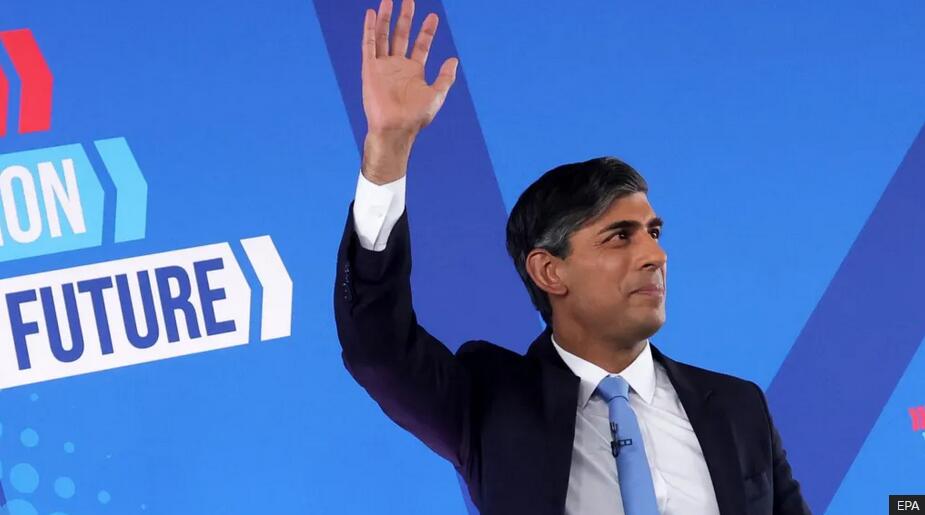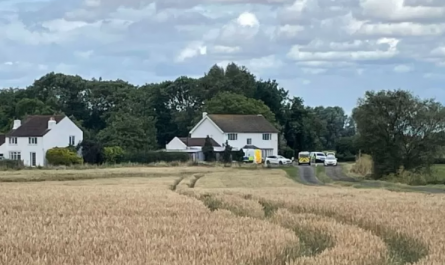Rishi Sunak has promised a series of tax cuts in the Conservatives’ election manifesto, including plans to reduce National Insurance (NI).
A promise to further lower the NI paid by employees was the biggest new pledge in a tax-cutting package estimated at £17bn per year by 2030.
The PM also pledged to reduce the main rate of NI paid by the self-employed, and abolish it completely by April 2029.
The manifesto argues the cuts could be accounted for by reducing welfare payments and cracking down on tax avoidance.
The general election campaign so far has been dominated by an increasingly bitter row between the main parties over the affordability of their spending plans.
‘Further downpayment’
The Conservatives have sought to put tax cuts at the centre of their offer to voters, after the overall tax burden rose to a post-war high in recent years, largely as a result of a previous decision to freeze income tax thresholds until 2028.
Over the last year it has announced two cuts to NI, a payroll tax paid by employees and employers, in a bid to reposition themselves as a tax-cutting party.
Launching the Tory manifesto at Silverstone racing circuit in Northamptonshire, Mr Sunak said he was not “blind to the fact that people are frustrated with our party and frustrated with me”, admitting “we have not got everything right”.
But he vowed that if re-elected, his party would “keep cutting taxes in the coming years”, including by reducing employee NI by 1p next April, and 2p by April 2027.
That is estimated to cost the Treasury £10.3bn in lost revenue by 2030.
The document also committed to reduce the amount of NI self-employed people pay on profits between £12,570 and £50,270 by 1p each year, meaning by April 2029 they would pay nothing at all.
The manifesto presented the cuts as a “further downpayment” on the Tories’ long-term ambition to abolish NI altogether at an unspecified point in the future.
“As Conservatives, we believe that hard work shouldn’t be taxed twice. That’s unfair,” the prime minister added.
He added that Labour’s Sir Keir Starmer “takes a very different view”.
“He says he’s a socialist and we all know what socialists do, don’t we? They take more of your money because they think it belongs to them,” Mr Sunak added.
In total, the Conservatives estimate their tax cuts would reduce the total tax take by £17.2bn a year by 2029/30.
The party says it can make up the shortfall by cutting the welfare bill by £12bn a year and raising £6bn more than presently by tackling tax avoidance.
It has also committed to several spending commitments, including a rise in defence spending, paid for by measures including shrinking the size of the civil service, cutting NHS managers and hiking visa fees.
Paul Johnson, director of the Institute for Fiscal Studies think tank, expressed scepticism about the “uncertain, unspecific and apparently victimless savings”.
In particular, he added that the planned welfare reforms were “not up to the challenge” of delivering savings worth £12bn a year.
Housing pledges
The manifesto also contained several new commitments designed to boost home ownership.
These include bringing back a new version of the Help to Buy scheme, which ended in England last year but is still available in Wales.
Under the revised programme, first-time buyers would be able to get a government loan worth up to 20% to buy a new-build property.
Hundreds of thousands of people have been bought through the scheme since it was launched in 2013 – although it has also been criticised as the “crack cocaine of the building industry”, and blamed for pushing up house prices.
Other pledges on housing include a two year scheme to scrap capital gains tax for landlords who sell their property to existing tenants.
The party has also committed to continue indefinitely the existing £425,000 threshold before first-time buyers have to pay stamp duty tax on purchases.
This threshold, which applies in England and Northern Ireland, was raised in 2022 and is currently due to end in March next year.
Other policies included in the Conservative manifesto include:
- Introduce a legal cap on migration by limiting the number of work and family visas
- Introduce the “Triple Lock Plus” for pensioners, to make sure income tax isn’t payable on a state pension
- Giving 30 towns £20m, and plans to boost community care by expanding Pharmacy First and building 100 new GP surgeries and modernising 150 more
- A plan to require 18-year-olds take part in a form of national service, choosing between either community volunteering or military training
- Recruiting 8,000 additional police officers over the next three years, paid for by increasing visa fees and removing the student discount to the Immigration Health surcharge
- Reintroducing Mr Sunak’s legislation to eventually ban smoking in the first parliamentary session after the election.


